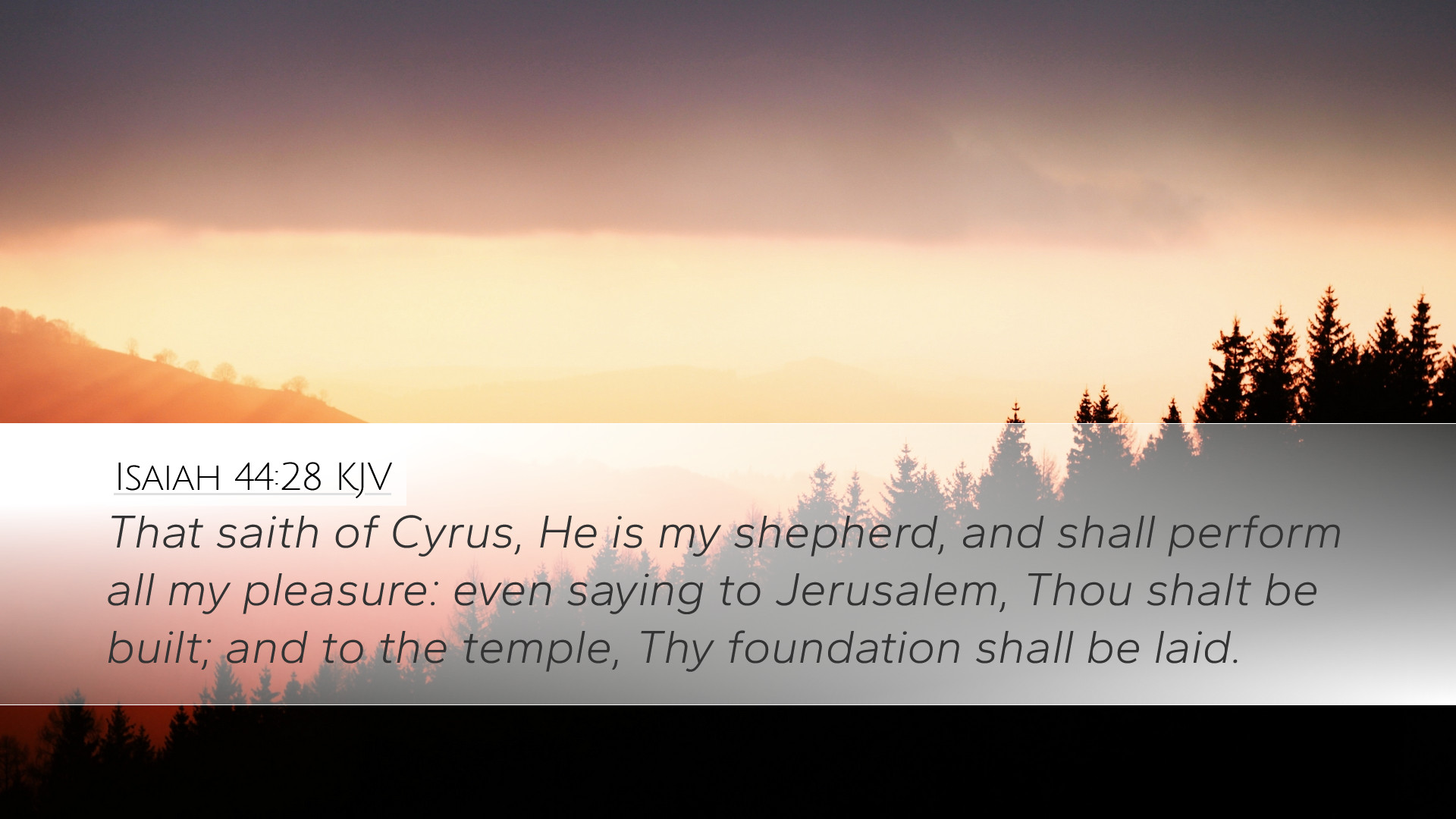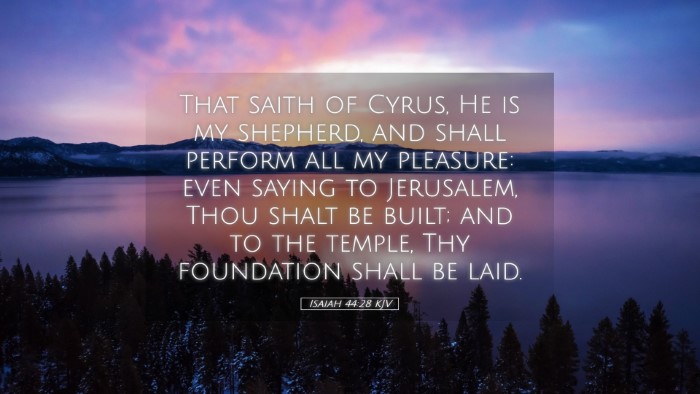Commentary on Isaiah 44:28
Introduction: Isaiah 44:28 states, "That saith of Cyrus, He is my shepherd, and shall perform all my pleasure: even saying to Jerusalem, Thou shalt be built; and to the temple, Thy foundation shall be laid." This verse is significant as it highlights God's sovereignty in using secular leaders for His purposes. The insights from various public domain commentaries provide a deeper understanding of this passage.
Exegesis of Isaiah 44:28
Contextual Background: The Book of Isaiah addresses both the judgment for Israel's sins and the hope of restoration. This particular verse appears as a remarkable prophecy concerning Cyrus, the king of Persia, who would later authorize the rebuilding of Jerusalem and the temple after the Babylonian exile. Such a declaration showcases God's overarching plan, demonstrating His control over history and politics.
Comments from Matthew Henry
Matthew Henry notes the significance of God's choice of Cyrus, emphasizing that God can use anyone, even a Gentile leader, to fulfill His divine will. He refers to Cyrus as a "shepherd," which suggests guidance and leadership, and underscores the theme that the prosperity of God’s people often comes through unexpected sources.
- Cyrus as a Shepherd: Henry interprets the designation of Cyrus as "my shepherd" as indicative of his role in bringing the Israelites back to their homeland, offering them safety and restoration.
- Divine Sovereignty: He emphasizes that this event illustrates God's sovereignty over nations and individuals, showing that He can direct rulers in accordance to His plans for His chosen people.
- Encouragement to Israel: This prophecy serves to encourage the Israelites, assuring them that despite their current exile, God has not forgotten them and will act on their behalf.
Insights from Albert Barnes
Albert Barnes offers a detailed examination of the text, stressing the importance of recognizing God's prophetic declarations. He remarks on how the mention of Cyrus by name, long before his birth, is a testament to the foreknowledge of God.
- Specific Prophecy: Barnes highlights the specificity of the prophecy which not only names Cyrus but provides a clear indication of his future actions regarding Jerusalem and the temple.
- Restoration of Jerusalem: Barnes points out that the promise of restoration to Jerusalem is central to understanding the comfort provided to the exiled Israelites, showcasing God's faithfulness to His covenant.
- Assurance of Fulfillment: He also notes the assurance that Cyrus would indeed act as an instrument of God, thus fulfilling all that God has purposed regarding His people.
Contributions from Adam Clarke
Adam Clarke adds depth to the understanding of the text by discussing the political context of Cyrus’s reign. He explains that the liberation of the Jews by Cyrus was not just a political maneuver but a fulfillment of God’s divine plan.
- Cyrus's Role in Prophecy: Clarke sees Cyrus as playing a pivotal role in the prophetic timeline, illustrating how God uses even the most unlikely people to execute His will.
- Temple Restoration: He provides insights into the importance of the temple in Jewish worship and identity, which restoration signifies a renewal of faith and community.
- Hope in Despair: Clarke emphasizes that this prophecy would have been a source of great hope to those in despair during the Babylonian captivity, reaffirming God’s promise to restore and rebuild.
Theological Themes
This verse encapsulates several important theological themes that are relevant to pastors, students, and theologians:
- God's Sovereignty: The sovereignty of God is vividly illustrated as He orchestrates events in human history for His purpose.
- Hope and Restoration: The passage provides profound hope for those facing despair, assuring them of God's faithfulness and plans for restoration.
- Instrumental Use of Leaders: It shows how God can use secular leaders as instruments for His divine purposes, encouraging a broader view of how God operates in the world.
- Covenant Faithfulness: The promise of restoration to Jerusalem reaffirms God's covenant faithfulness, assuring His people that He is actively working on their behalf.
Application for Today
The relevance of Isaiah 44:28 extends to modern believers in several ways:
- Faith in God's Plan: Believers are encouraged to trust in God's overarching plan for their lives, knowing He is actively at work in both personal and communal contexts.
- Encouragement in Difficult Times: Like the exiled Israelites, Christians can draw strength from knowing that God has not abandoned them, even in times of distress.
- Understanding Leadership: This passage invites reflection on how Christian leaders today can be instruments of God’s restoration, emphasizing the importance of godly leadership.
Conclusion
Isaiah 44:28 is a powerful reminder of God's sovereign hand in history and His unfailing commitment to His people. Through the prophetic declaration concerning Cyrus, we learn about God's ability to use even the most unlikely individuals to fulfill His divine purposes. The insights offered by commentators such as Matthew Henry, Albert Barnes, and Adam Clarke illuminate the richness of this text, providing encouragement and hope for believers as they navigate their faith in a complex world.


